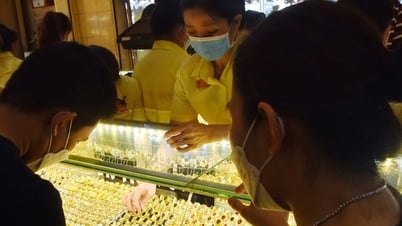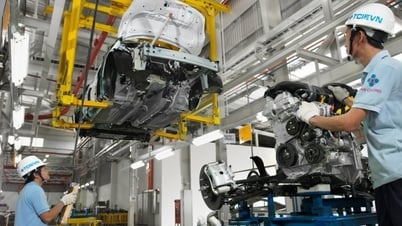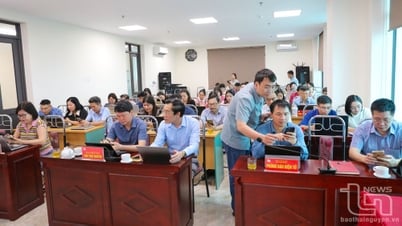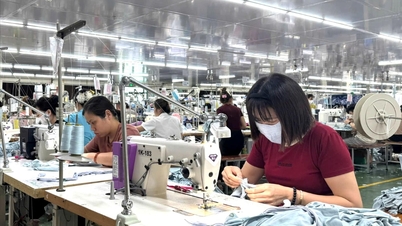Ending lump-sum tax, what benefits for business households?
According to Decree 70/2025/ND-CP of the Government , from June 1, business households and individuals with annual revenue of over 1 billion VND from selling goods, providing services, catering, restaurants, hotels, passenger transport services, etc. will have to stop paying lump-sum tax. Instead, use electronic invoices generated from cash registers connected to transfer electronic data to tax authorities.
To clarify this issue, the reporter had an interview with economic expert, Dr. Nguyen Quoc Viet - University of Economics, Vietnam National University, Hanoi.
- From June 1, business households with annual revenue of over 1 billion VND will have to abandon lump-sum tax and pay tax by electronic invoice. What do you think about this regulation?
Dr. Nguyen Quoc Viet: In my opinion, ending lump-sum tax for business households with revenue of over 1 billion VND per year is necessary, this will bring practical benefits, promoting the activities of business households.
Economist, Dr. Nguyen Quoc Viet - University of Economics, Vietnam National University , Hanoi |
The first benefit is that eliminating lump-sum tax and switching to self-declaration of taxes will help businesses operate more formally and professionally. Because with this new regulation, businesses will have to standardize accounting records and keep complete documents and invoices.
Whether paying taxes in the form of lump sums or self-declaring electronic invoices, the responsibility of business households is still to prove the origin of goods and services. However, in the past, this responsibility was not fully implemented.
When switching to self-declaration of taxes, business households will have to "upgrade" their standards from tax, accounting to production and business activities, thereby helping business households become more standardized in their production and business management. This is of great significance to the development of business households and brings them new development opportunities.
The second benefit is that it helps businesses avoid very large risks that may occur. Because if the origin and source of intermediate goods used by businesses are not fully documented, in case those products violate factors regarding product quality and origin, it will directly affect the business's operations. However, if the documents are fully documented and clearly prove the origin, then when there is a problem with the goods, businesses can avoid the risks that they may face.
The third benefit when business households switch from lump-sum tax to self-declaration of tax is that, when participating in the value chain, especially the export value chain, manufacturers and enterprises can use inputs such as products or services from business households. They also require that the entire production and business process of business households must have full documents and origins proving the legality of goods. Accordingly, if implementing the new tax regulations, business households will have opportunities to expand production, business and participate in the production chain of large enterprises, even the global value chain.
These are the benefits that business households can receive if they switch from lump-sum tax to declared tax payment.
Switching from lump-sum tax to paying taxes by electronic invoice will bring practical opportunities for business households. Photo: Thu Thuy |
Establish a transparent and effective business environment
- Besides the benefits you just mentioned, business households are also quite worried because they are afraid of increased costs and complications in the process of applying tax payment by electronic invoice. How do you view this issue?
Dr. Nguyen Quoc Viet : Changing from an old model to a new model always has initial obstacles, especially since June 1, business households with annual revenue of over 1 billion VND, operating in a number of fields will have to use electronic invoices generated from cash registers connected to transfer electronic data to tax authorities, to ensure all declarations of input and output revenue in production and business activities of business households are in accordance with regulations.
This may create additional costs for businesses, from investing in equipment to having to have software, buying electronic signatures, etc., which will also incur certain costs for businesses. Not to mention, such a conversion requires businesses to keep accounting books according to regulations, although it may be less than the requirements of a business, it is still more complicated than businesses that previously applied the lump-sum tax form.
For business households that are not familiar with business accounting methods, having complete and clear accounting books is also an obstacle for them.
In that context, it requires state agencies, including tax authorities as well as local authorities, to be flexible in implementation. At the same time, there should be time to guide and support business households to get used to it, avoid imposition and especially avoid using too rigid forms of punishment.
Because if it is rigid, it will only cause households and individuals to completely switch to informal activities or have unnecessary reactions. Thus, the set goals will not be achieved and the business environment will not be improved, and tax management activities will be difficult to implement effectively.
- The benefits for business households seem to be quite positive. So, what will be the benefits for the economy and state agencies if we switch from lump-sum tax to paying taxes by electronic invoice, sir?
Dr. Nguyen Quoc Viet: In my opinion, for the state, the first benefit that we can see is that all activities of business households are fully declared. This will limit problems such as tax evasion, or factors related to smuggling, counterfeit goods, fake goods, poor quality goods, this is a very "hot" issue recently.
The second benefit is to build a transparent and equal business environment among economic sectors. Because if the form of tax payment by declaration is not applied, the business sector will be subject to more control, they will do business more seriously and pay more taxes. Meanwhile, business households will not be subject to much control.
Not to mention, lump-sum tax is an emotional form, sometimes not commensurate with the profits and revenues of business households. Such an unequal environment will give rise to problems and can lead to consequences such as "collusion" with local authorities and tax authorities, corruption and an unhealthy business environment.
If the quality of tax management is not improved and state policies and laws are not strictly enforced, it will have a negative impact on the country's overall economy.
Thank you!
According to the General Statistics Office (Ministry of Finance), by the end of 2024, the country will have 3.6 million business households under tax management, contributing VND 25,953 billion to the state budget. Of these, nearly 2 million households are applying the lump-sum tax method. Currently, the average monthly lump-sum tax that these business households have to pay is only about VND 700,000 per month. |
Nguyen Hoa (performed)
Source: https://congthuong.vn/cham-dut-thue-khoan-loi-cu-khep-lai-duong-moi-mo-ra-390256.html



































































































Comment (0)